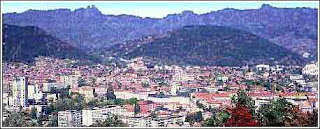Another workshop at Targovishte – and the morning swim and exercise we have now started in Sofia Shumen
The Elena Karamihaylova Gallery was known only by two elderly ladies and was initially a disappointment – since the second floor containing the permanent collection was closed for reconstruction. But conversations with 3 (of the 7) staff managed to convey our love of Bulgarian painting and the Director graciously presented us with an attractive pack containing 20 postcards of the paintings, a CD and a small booklet giving the history of the collection and short notes on the artists.
When, however, I mentioned the name Alexander Moutafov (who was apparently born in Shumen
Valentina Velikova, the paintings expert, took us to the archives where we saw the collection (of 1,300 items) stored and filed. And she was kind enough to find and pull out for our inspection various portraits by Elena Karamihaylova and paintings by Nikola Tanev, Alexander Moutafov and Stanio Stamatov. Marvellous to have a chance to handle such work. And great that a small gallery should have developed such a nice pack. They are rare amongsdt Regional galleries in having a CD - only Kazanlak (so far on my travels) has offered such a product. It is so simple, cheap to creat - and so necessary given the large numbers of paintings which are doomed to spend their life in basement archives!
During the journey, I had said that I did not think that Brits had made their home in this part of the country - but, on the way back to the hotel, we popped into a Lidl supermarket and got into conversation with a british couple who have been living in a village outside Shumen for the past 5 years. They told us that quite a few Brits were in the area.








